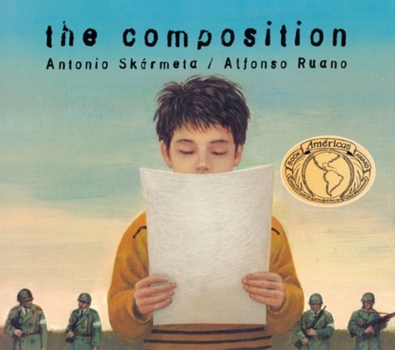The Composition
Select Format
Select Condition 
Book Overview
Pedro is a nine-year-old boy whose main interest in life is playing soccer. The arrest of his friend Daniel's father and a visit to the school of an army captain who wants the children to write a composition entitled What My Family Does at Night suddenly force Pedro to make a difficult choice. The author's note explains what a dictatorship is and provides a context for this powerful and provocative story.
Format:Paperback
Language:English
ISBN:0888995504
ISBN13:9780888995506
Release Date:January 2003
Publisher:Groundwood Books
Length:36 Pages
Weight:2.50 lbs.
Dimensions:0.1" x 9.1" x 8.1"
Age Range:8 years and up
Grade Range:Grade 3
Customer Reviews
1 rating
This composition sings
Published by Thriftbooks.com User , 20 years ago
At first glance, "The Composition" is a book that simply describes military dictatorships in a way that children will understand. On a closer look, however, Antonio Skarmeta's brilliant 2000 creation does more than that. It shows how every human being, regardless of age, can fight injustice on an individual level. It displays sympathetic characters that are punished for thinking for themselves. And it is one of the first picture books I've ever read where the main character is a child that outsmarts a fascist regime. Pedro lives in an unnamed South American country with his mother and father. Each day after work his parents sit on the sofa to listen to foreign radio stations about their country's military dictatorship. Pedro doesn't really understand the importance of this, preferring to play soccer with his friends. One day, while playing, he sees the father of one of his friends being led away by a group of soldiers. That night Pedro finds that his own parents, like Daniel's, are against their country's form of government. When he asks if he himself is against the dictatorship his mother replies, "Children aren't against anything. Children are just children". The next day a military man enters Pedro's classroom with an assignment. They are to write a composition under the soldier's watchful eye entitled, "What my family does at night". Pedro thinks it through and after talking with his friend Juan proceeds to write. In the end, the reader discovers that sometimes children are far cannier than the adults around them might suspect. In many ways the real question this story raises is whether or not children have the ability to make careful informed decisions. On the outset, Pedro's mother thinks this isn't possible. She believes that kids are innocent and incapable of deep thought. When Pedro tells Juan this, his friend's response is, "They all say that. They took my father away up north". So you see, when a child is affected personally by the events around him/her, that child cannot help but come to their own conclusions. What Pedro writes in the end is a clever tale of how his parents usually come home and, after dinner, play chess. The last line of the book (after Pedro has read this composition to his parents) is this: "Well", said his father, "we'd better buy a chess set". Fabulous writing. Would you expect anything less from the author that wrote the novel on which the film "Il Postino" was based? I loved the plot of this book and, in a way, I wished that the illustrations matched it. The pictures here are fine, of course. They accurately portray the ways in which kids feel the effects of life in a strictly controlled country. Illustrator Alfonso Ruano also isn't afraid to focus his attention on the seemingly innocuous elements of a tale. When the children are told the subject of their composition, the picture on the facing page is of an eraser that has had a small hole drilled into it. Two pages later you see Pedro grasping the





